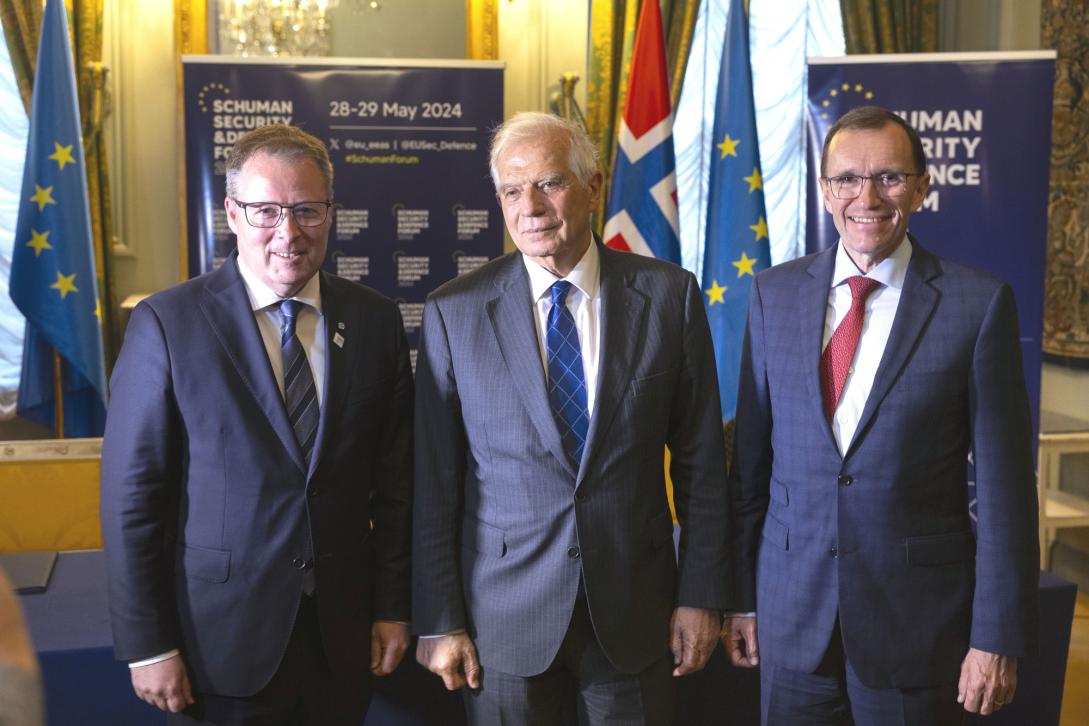The EU's Expanding Toolkit for Partnerships in Peace and Security

Pictured from left to right: Bjørn Arild Gram, Minister of Defence of Norway, Josep Borrell, HR/VP of European Union, Espen Barth Eide,Minister of Foreign Affairs of Norway
The EU is bolstering its position as a global leader in peace, security, and defence, as per the 2022 Strategic Compass.
It has created a comprehensive 'partnerships toolkit' under the Common Security and Defence Policy (CSDP) and in peacebuilding and conflict prevention fields.
The Strategic Compass outlines the EU's security and defence goals for the next decade, emphasising the significance of partnerships.
Through tailored and mutually beneficial alliances with bilateral and multilateral partners worldwide, the EU is enhancing its reputation as a peace facilitator, a reliable security provider, and a competent defence actor.
Tailored Frameworks for Cooperation
The EU offers various partnership frameworks to suit different needs.
- Participation Agreements (FPAs), which are binding agreements that allow bilateral partners to partake in EU civilian and military missions and operations.
- Security and Defence Partnerships, which are non-binding instruments that offer a flexible and customized framework for enhanced political and practical cooperation on specific security themes with selected partners.
- Security of Information Agreements (SoIA) or Administrative Arrangements (AA) which offer partners the option to establish an easier exchange of classified information and improves collaboration with EU agencies.
Platforms for Dialogue and Exchange
Regular dialogue is at the heart of the EU’s engagement in peace, security and defence. It is essential for building trust and to develop cooperation with partners.
The EU facilitates discussions through various platforms:
- The Schuman Security & Defence Forum hosts high-level representatives and policymakers for strategic discussions on peace, security, and defence.
- Over 80 Security and Defence Dialogues focus on specific themes, such as maritime security, counter-terrorism, and cybersecurity, with bilateral partners.
- The EU Community of Practice on Peace Mediation encourages knowledge exchange among peacemakers.
- Dedicated conferences and workshops tackle regional and thematic security concerns.
Peace, Security and Defence Tools for Action
The EU's partnership toolkit includes various instruments to address peace and security challenges:
- Civilian and military missions: Partner countries contribute personnel and expertise to EU-led missions, with over 4,800 personnel currently deployed in 24 missions (13 civilian, 10 military, and 1 joint).
- Capacity building: The EU assists partners in reforming their security and defence sectors and enhancing capabilities through instruments like the European Peace Facility.
- Countering emerging threats: The EU collaborates with partners to tackle hybrid threats, cyberattacks, and foreign information manipulation and interference (FIMI).
- Maritime security: Cooperation involves Coordinated Maritime Presences, information sharing, and joint exercises.
- Peace mediation: The EU offers expert advice and financial resources to support peace processes in partner countries.
- Early warning and action: The EU works with partners to identify and address potential conflicts at an early stage.
The Strength of Multilateral Cooperation
The EU is dedicated to fostering international cooperation, upholding a rules-based international order, and reinforcing effective multilateralism. It acknowledges the value of collaborating with other international and regional organizations, which include:
- United Nations (UN)
- North Atlantic Treaty Organization (NATO)
- African Union (AU)
- Organization for Security and Co-operation in Europe (OSCE)
- Association of Southeast Asian Nations (ASEAN)
- Economic Community of West African States (ECOWAS)
- Gulf Cooperation Council (GCC)
- Follow the link to read more about the new EU-Norway partnership agreement on security and defence.





